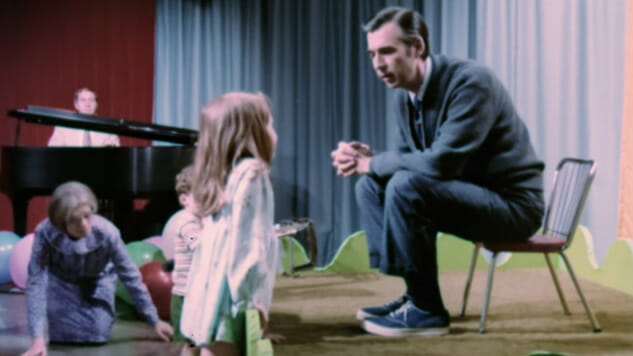Won’t You Be My Neighbor?

1. Of the things that Won’t You Be My Neighbor? gets right about Fred Rogers, foremost among them is that he was weird. This has been touched on in popular culture before—his preternatural calm and stillness is what made him so easy to parody—but in its best sections, Neighbor, a documentary about the late minister and television star, certainly leans into Rogers’ inherent oddities, even if director Morgan Neville doesn’t exactly understand them. This is a person who, steadfastly from adulthood until the day he died, made sure he weighed exactly 143 pounds because the number represented love to him (one letter in “I,” four letters in “love” and three letters in “you”) and never once wavered from it. That’s truly impressive but also…pretty strange? The primary fascination of Won’t You Be My Neighbor? lives when it stands outside this man and stares at him, unfathomably, wondering what in the world must have made him tick. The film tries to do more than that, with varying levels of success, but that’s the core: Who is this guy?
2. As told by Neville (20 Feet from Stardom), Rogers is a near Christ-like figure from the start. Raised in a suburban Pittsburgh home where he often felt neglected and alone, a young Fred Rogers began playing the piano, creating puppet friends and dedicating himself to theological studies. His life would have been worthy but not much remarked upon had he not become obsessed with television and the power it would have in affecting the minds of children, the focus of most of his interest and academic study. So, like thousands of television stars before and after him, Rogers went to work at getting himself famous and his message across, starting with public access television in Pittsburgh and eventually, in no small part because of his successful lobbying in front of Congress for increased federal funding for public television, ending up in every household in America. What was, and remains, most staggering about Rogers is the purity of his vision: He just wanted to talk to children in the purest, simplest way possible, promoting basic, common, decent values, helping them navigate the terrifying, impossible waters of childhood, and then adulthood. He tackled difficult issues, he spoke on social justice, he was a shining example of what a good person can, and should, be.
3. The movie understands all this, and in its weakest moments, tries to make this into a Lesson For Us All, with Rogers a person whom we should all emulate in—and this is both spoken and unspoken in the film—these Dark Times. Much of the movie’s success and ability to please audiences will most likely come from this, the contrast between the gentleness and warmth of Rogers and the crass greed and cruelty of our current cultural moment. But those who grew up with Rogers will probably gravitate more towards Rogers the person than Rogers the icon. How did this person come to be? The movie doesn’t have the answers, but it’s still endlessly fascinating to see his friends and family try to describe the kind alien who seemed to be dropped into their midst. His children speak of him in awe; the teamsters who worked on his shows remark how they were careful not to curse around him but still loved his sense of humor; the head of his current museum appears to have patterned his entire being and spirit on Rogers. The central figure remains Rogers’ late wife Joanne, who tells stories of Rogers like she knows all the secrets but isn’t going to spill them here, or maybe to anyone. The glimpses into Rogers’ day-to-day life are the film’s high points, even if they leave you wanting more. You come away amazed that he existed at all.
-

-

-

-

-

-

-

-

-

-

-

-

-

-

-

-

-

-

-

-

-

-

-

-

-

-

-

-

-

-

-

-

-

-

-

-

-

-

-

-








































